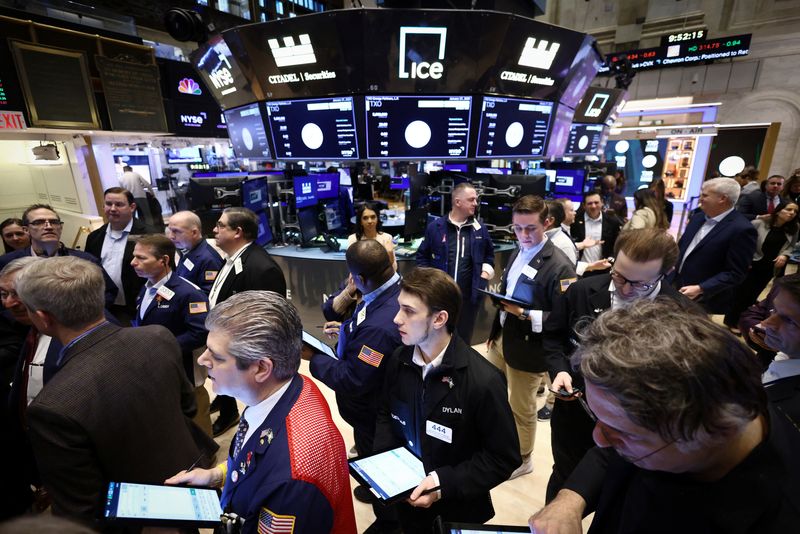 © Reuters. FILE PHOTO: Traders work on the trading floor at the New York Stock Exchange (NYSE) in New York City, U.S., January 27, 2023. REUTERS/Andrew Kelly/File Photo
© Reuters. FILE PHOTO: Traders work on the trading floor at the New York Stock Exchange (NYSE) in New York City, U.S., January 27, 2023. REUTERS/Andrew Kelly/File Photo
By Lewis Krauskopf, Shreyashi Sanyal and Johann M Cherian
(Reuters) - The Nasdaq and S&P 500 ended higher on Thursday and touched roughly five-month highs as a more dovish-than-expected message from Federal Reserve Chair Jerome Powell boosted equities and Meta Platforms shares soared on rigorous cost controls.
The Dow slipped, dragged down by declines in some big healthcare stocks.
Investors were still digesting the Fed's policy decision on Wednesday and comments from Powell, who acknowledged progress in the fight against inflation and appeared reluctant to push back against the rally in stocks and bonds.
“I think the reaction to yesterday’s Fed comments really encouraged investors to go risk on,” said Rick Meckler, partner at Cherry Lane Investments in New Vernon, New Jersey. "The bottom line for investors I think is that the Fed’s comments were unexpected.”
The Dow Jones Industrial Average fell 39.02 points, or 0.11%, to 34,053.94, the S&P 500 gained 60.55 points, or 1.47%, to 4,179.76 and the Nasdaq Composite added 384.50 points, or 3.25%, to 12,200.82.
Shares of megacap stocks Apple (NASDAQ:AAPL), Amazon (NASDAQ:AMZN) and Google parent Alphabet (NASDAQ:GOOGL) also gained strongly ahead of results due after market close on Thursday, with Apple rising 3.7%, and Amazon and Alphabet both up over 7%.
In initial after-hours trading, however, shares of all three companies fell after their respective results.
After a bruising 2022, U.S. stock markets have made a strong start to the year, with tech and other stocks that lagged last year leading the rebound amid hopes that the Fed will temper its aggressive rate hikes, which in turn could alleviate some pressure on equity valuations.
Those trends continued on Thursday. The communications services sector jumped 6.7%, its biggest daily gain in almost three years, led by a 23.3% surge for Facebook (NASDAQ:META) parent Meta. The company revealed stricter cost controls this year and a $40 billion share buyback, as CEO Mark Zuckerberg called 2023 the "year of efficiency."
The S&P 500's 50-day moving average moved above the 200-day moving average, a pattern known as a "golden cross" that is perceived by many as a bullish technical signal for near-term momentum.
The energy sector, one of last year's standout performers, fell 2.5%, while healthcare dropped 0.7%.
UnitedHealth Group (NYSE:UNH) shares fell 5.3% after the U.S. government proposed Medicare Advantage reimbursement rates below analyst estimates, and the stock weighed down the Dow. A 3.3% decline in Merck shares, after the drugmaker forecast 2023 earnings below Wall Street estimates, also dragged on the blue chip index.
Shares of drugmaker Eli Lilly (NYSE:LLY) dropped 3.5% after sales of its closely watched diabetes drug missed estimates.
Data showed jobless claims fell last week to a nine-month low, highlighting the labor market's resilience, ahead of monthly U.S. employment numbers on Friday.
Advancing issues outnumbered declining ones on the NYSE by a 2.29-to-1 ratio; on Nasdaq, a 2.55-to-1 ratio favored advancers.
The S&P 500 posted 36 new 52-week highs and one new low; the Nasdaq Composite recorded 162 new highs and 16 new lows.
About 15 billion shares changed hands in U.S. exchanges, compared with the 11.7 billion daily average over the last 20 sessions.

